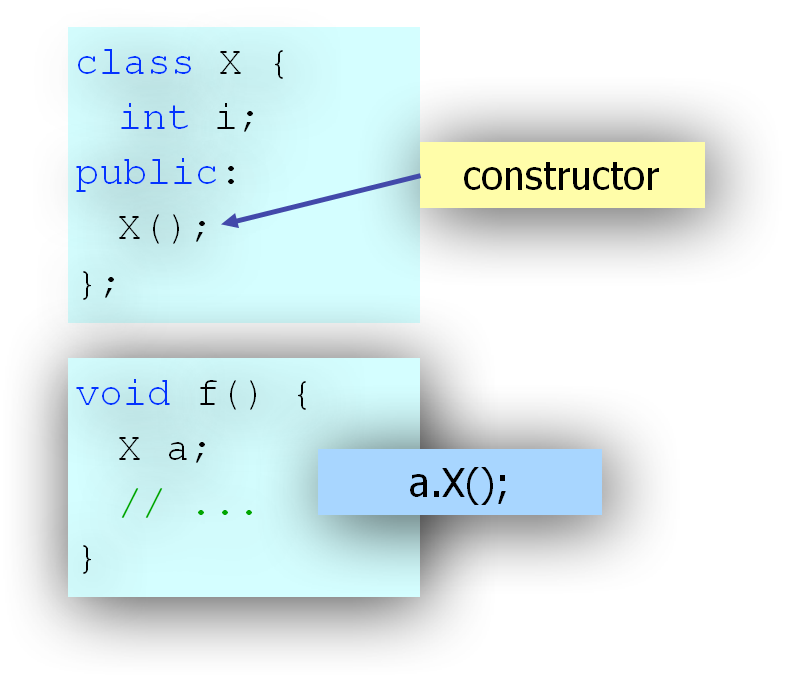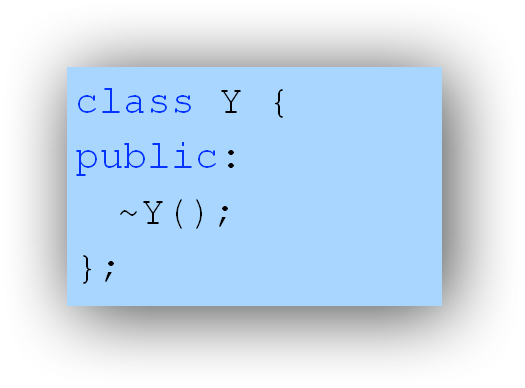C'tor and D'tor
The constructor
If a class has a constructor, the compiler automatically calls that constructor at the point an object is created
The name of the constructor is the same as the name of the class.
How a constructor does?


Constructors with arguments
The constructor can have arguments to allow you to specify how an object is created, give it initialization values, and so on.
The default constructor
A default constructor is one that can be called with no arguments
“auto” default constructor
If you have a constructor, the compiler ensures that construction always happens.
If (and only if) there are no constructors for a class (struct or class), the compiler will automatically create one for you.
The destructor
In C++, cleanup is as important as initialization and is therefore guaranteed with the destructor
- The destructor is named after the name of the class with a leading tilde (
~). - The destructor never has any arguments
- The destructor is called automatically by the compiler when the object goes out of scope.

Storage allocation
The compiler allocates all the storage for a scope at the opening brace of that scope.
Aggregate initialization
int a[5] = {1,2,3,4,5};
int b[6] = {5};
int c[] = {1,2,3,4};
- sizeof c / sizeof *c
struct x { int i; float f; char c; };
- X x1 = {1, 2.2, 'c'};
X x2[3] = { {1, 1.1, 'a'}, {2, 2.2, 'b'} }
struct Y { float f; int i; Y(int a); };
Y y1[] = { Y(1), Y(2), Y(3) };
Fields,parameters,local variables
All three kinds of variable are able to store a value that is appropriate to their defined type.
- Fields (member variables) are defined outside constructors and methods
- Fields are used to store data that persists throughout the life of an object.
- they maintain the current state of an object. They have a lifetime that lasts as long as their object lasts.
- Fields have class scope: their accessibility extends throughout the whole class
- Formal parameters:即传参变量
- Local variables :即内部新定义的,若与外面的变量同名会屏蔽外面的
Initialization vs. assignment
初始化 (Initialization):
-
初始化是指在创建变量时为其指定初始值的过程。
初始化通常发生在以下场景:
- 声明变量并为其指定值:
int x = 10; - 使用构造函数创建对象时:
MyClass obj(5); - 使用列表初始化语法创建集合类对象:
std::vector<int> numbers {1, 2, 3};
- 声明变量并为其指定值:
赋值 (Assignment):
- 赋值是指在变量已经创建之后,改变其现有值的过程。
- 赋值使用赋值运算符 (
=) 完成:x = 20; - 赋值会改变变量原有的值,将其替换为新的值。
| 特征 | 初始化 | 赋值 |
|---|---|---|
| 发生时机 | 创建变量时 | 变量创建之后 |
| 目的 | 为变量指定初始值 | 改变变量现有值 |
| 相关语法 | 声明变量并赋值, 构造函数, 列表初始化 | 赋值运算符 (=) |
class MyClass {
public:
int value;
// 构造函数,初始化 value 成员变量
MyClass(int val) : value(val) {}
};
int main() {
// 初始化变量
int x = 10;
double pi = 3.14159;
// 对象初始化
MyClass obj1(20);
// 赋值操作
x = 30;
pi = 22 / 7.0; // 改变 pi 的值
return 0;
}
Function overloading
Same functions with different arguments list, auto-cast.
void print(char * str, int width); // #1
void print(double d, int width); // #2
void print(long l, int width); // #3
void print(int i, int width); // #4
void print(char *str); // #5
print("Pancakes", 15);
print("Syrup");
print(1999.0, 10);
print(1999, 12);
print(1999L, 15);
void f(short i);
void f(double d);
f(‘a’); f(2);
f(2L);
f(3.2);
Default arguments
To define a function with an argument list, defaults must be added from right to left.
int harpo(int n, int m = 4, int j = 5);
int chico(int n, int m = 6, int j);//illeagle
int groucho(int k = 1, int m = 2, int n = 3);
beeps = harpo(2);
beeps = harpo(1,8);
beeps = harpo(8,7,6);
const object
Const member functions
Cannot modify their objects
int Date::get_day() const {
day++; //ERROR modifies data member
set_day(12); // ERROR calls non-const member
return day; // ok
}
int Date::set_day(int d){
//...error check d here...
day = d; // ok, non-const so can modify
}
Function members that do not modify data should be declared const
const member functions are safe for const objects
Const objects
// non-const object
Date when(1,1,2001); // not a const
int day = when.get_day(); // OK
when.set_day(13); // OK
// const object
const Date birthday(12,25,1994); // const
int day = birthday.get_day(); // OK
birthday.set_day(14); // ERROR
Constant in class
Compile-time constants in classes
class HasArray {
const int size;
int array[size]; // ERROR!
...
};
//Make the const value static:
static const int size = 100;
//static indicates only one per class (not one per object)
//Or use “anonymous enum” hack:
Class HasArray{
enum { size = 100 };
int array[size]; // OK!
…
}
type of function parameters and return value
???
way in
void f(Student i);
a new object is to be created in f
void f(Student *p);
better with const if no intend to modify the object
void f(Student& i);
better with const if no intend to modify the object
way out
Student f();
a new object is to be created at returning
Student* f();
what should it points to?
Student& f();
what should it refers to?
hard decision
//define a pair functions of alloc and free
char *foo()
{
char *p;
p = new char[10];
strcpy(p, "something");
return p;
}
//Let user take resp., pass pointers in & out
void bar()
{
char *p = foo();
printf("%s", p);
delete p;
}
tips
- Pass in an object if you want to store it
- Pass in a const pointer or reference if you want to get the values
- Pass in a pointer or reference if you want to do something to it
- Pass out an object if you create it in the function
- Pass out pointer or reference of the passed in only
- Never new something and return the pointer